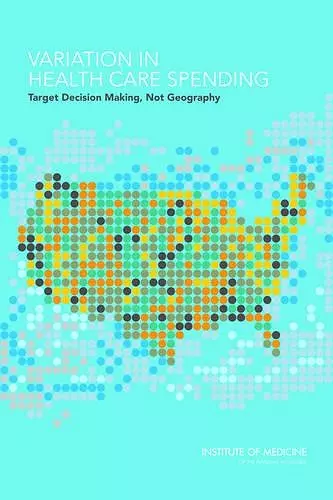Variation in Health Care Spending
Target Decision Making, Not Geography
Institute of Medicine author Board on Health Care Services author Committee on Geographic Variation in Health Care Spending and Promotion of High-Value Care author Joseph P Newhouse editor Alan M Garber editor Margaret A McCoy editor Michelle Mancher editor Robin P Graham editor
Format:Paperback
Publisher:National Academies Press
Published:1st Nov '13
Currently unavailable, and unfortunately no date known when it will be back

Health care in the United States is more expensive than in other developed countries, costing $2.7 trillion in 2011, or 17.9 percent of the national gross domestic product. Increasing costs strain budgets at all levels of government and threaten the solvency of Medicare, the nation's largest health insurer. At the same time, despite advances in biomedical science, medicine, and public health, health care quality remains inconsistent. In fact, underuse, misuse, and overuse of various services often put patients in danger. Many efforts to improve this situation are focused on Medicare, which mainly pays practitioners on a fee-for-service basis and hospitals on a diagnoses-related group basis, which is a fee for a group of services related to a particular diagnosis. Research has long shown that Medicare spending varies greatly in different regions of the country even when expenditures are adjusted for variation in the costs of doing business, meaning that certain regions have much higher volume and/or intensity of services than others. Further, regions that deliver more services do not appear to achieve better health outcomes than those that deliver less. Variation in Health Care Spending investigates geographic variation in health care spending and quality for Medicare beneficiaries as well as other populations, and analyzes Medicare payment policies that could encourage high-value care. This report concludes that regional differences in Medicare and commercial health care spending and use are real and persist over time. Furthermore, there is much variation within geographic areas, no matter how broadly or narrowly these areas are defined. The report recommends against adoption of a geographically based value index for Medicare payments, because the majority of health care decisions are made at the provider or health care organization level, not by geographic units. Rather, to promote high value services from all providers, Medicare and Medicaid Services should continue to test payment reforms that offer incentives to providers to share clinical data, coordinate patient care, and assume some financial risk for the care of their patients. Medicare covers more than 47 million Americans, including 39 million people age 65 and older and 8 million people with disabilities. Medicare payment reform has the potential to improve health, promote efficiency in the U.S. health care system, and reorient competition in the health care market around...
ISBN: 9780309288699
Dimensions: unknown
Weight: unknown
206 pages